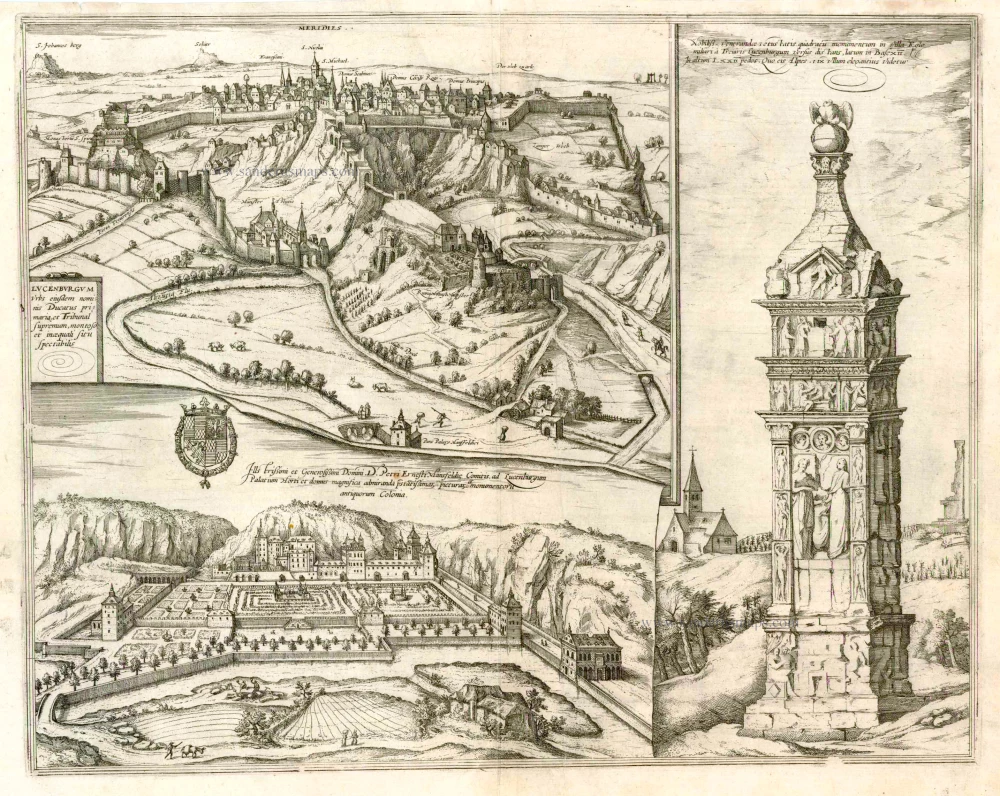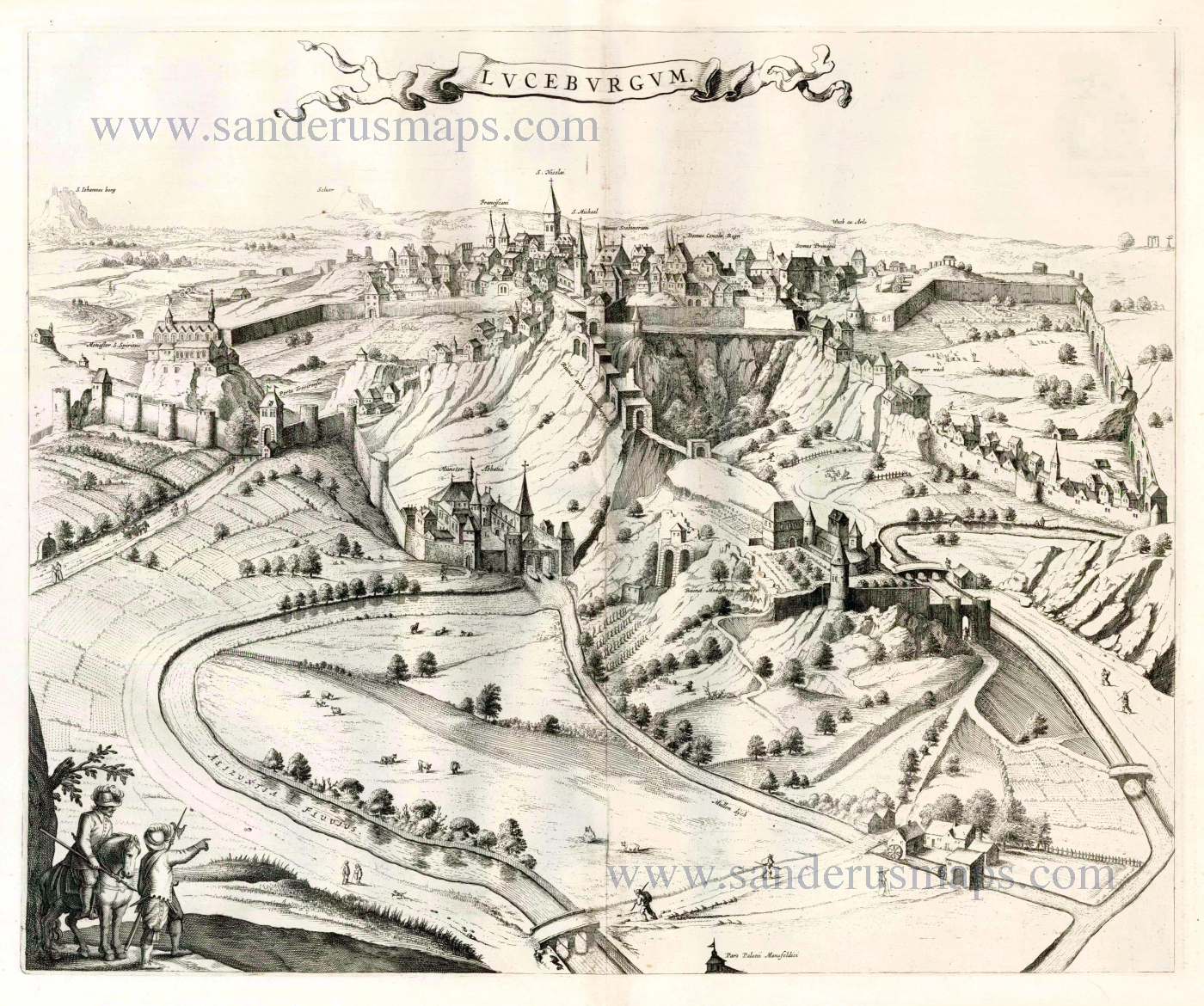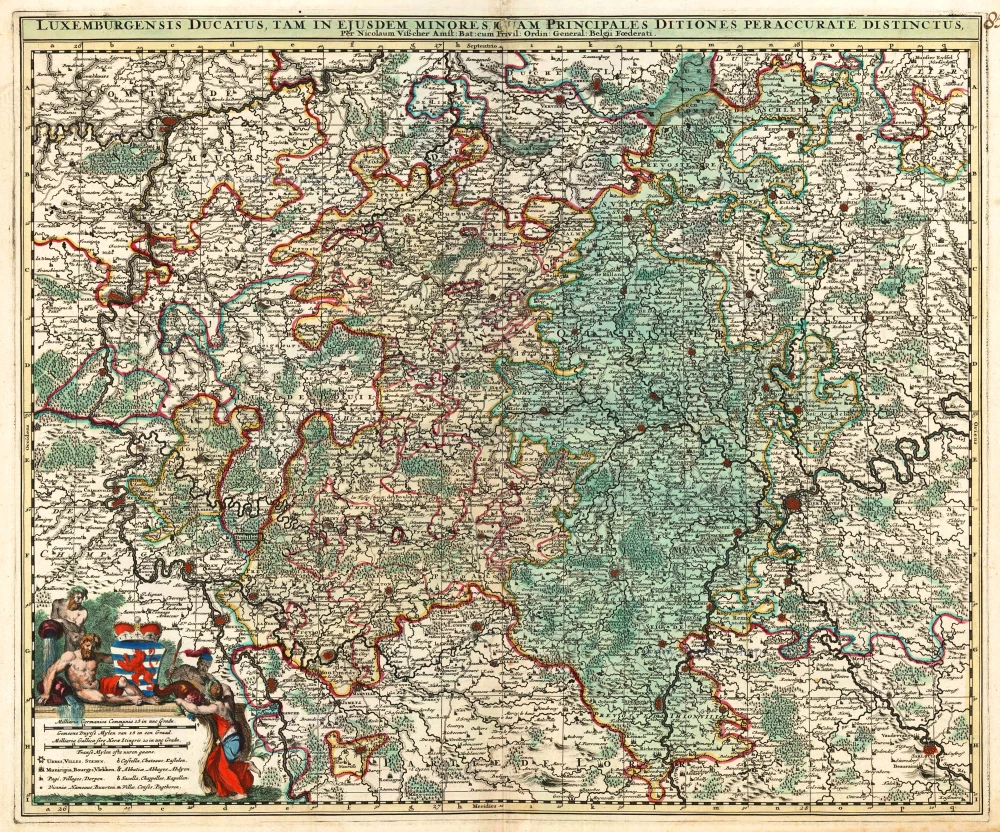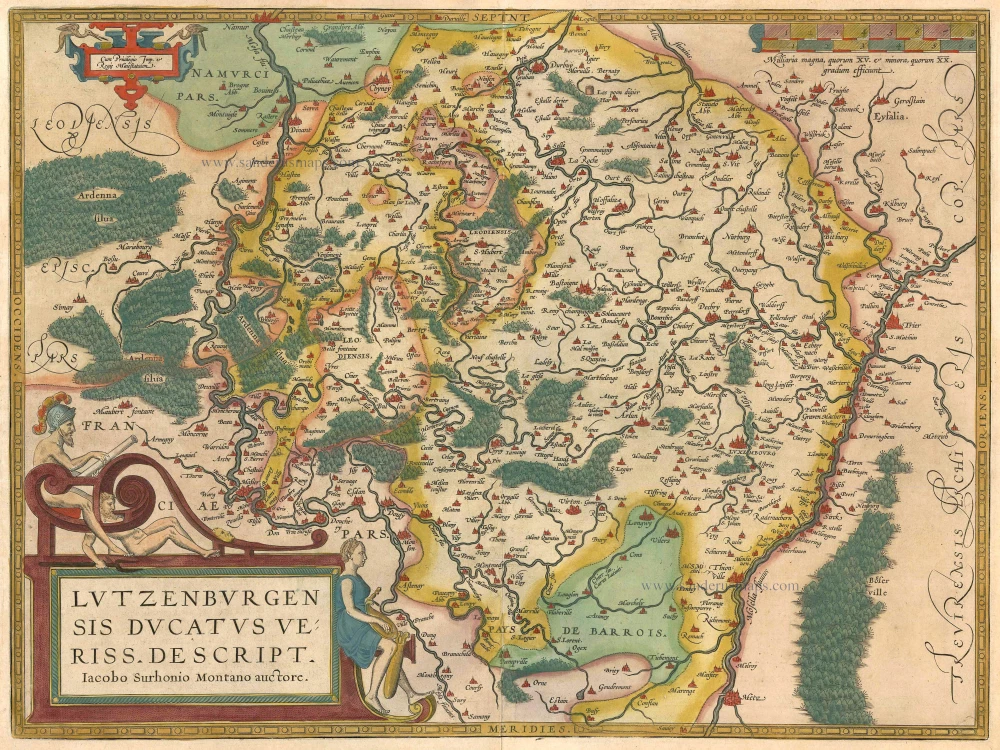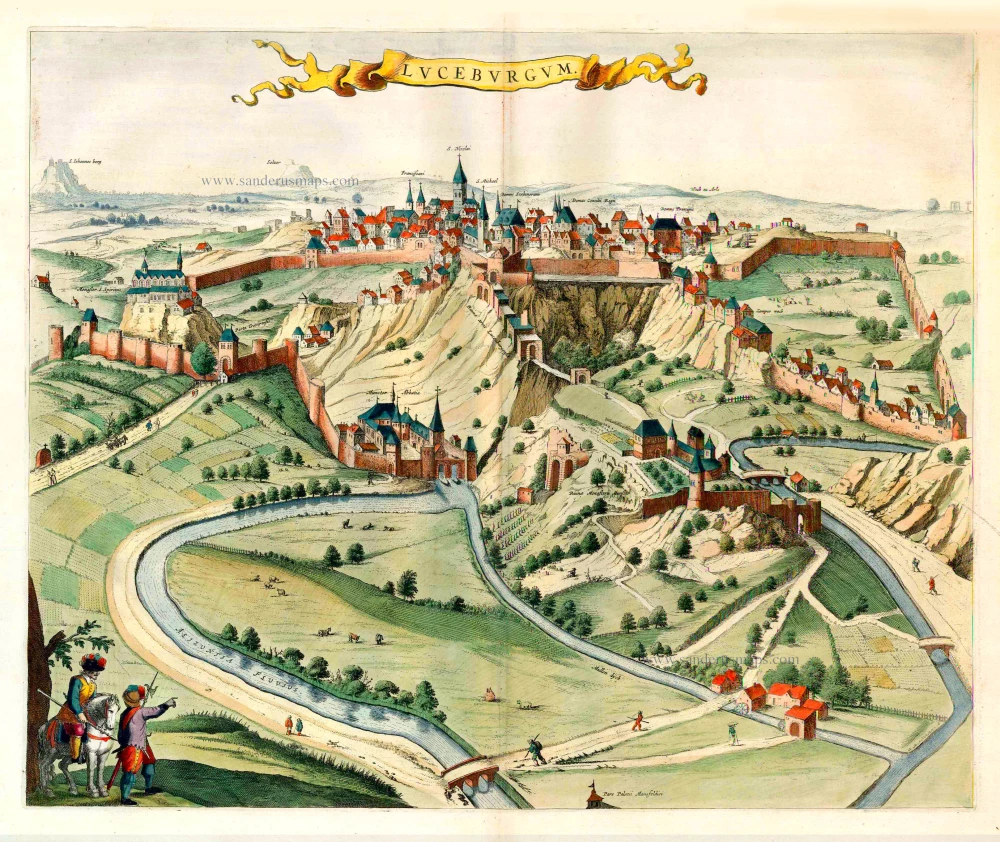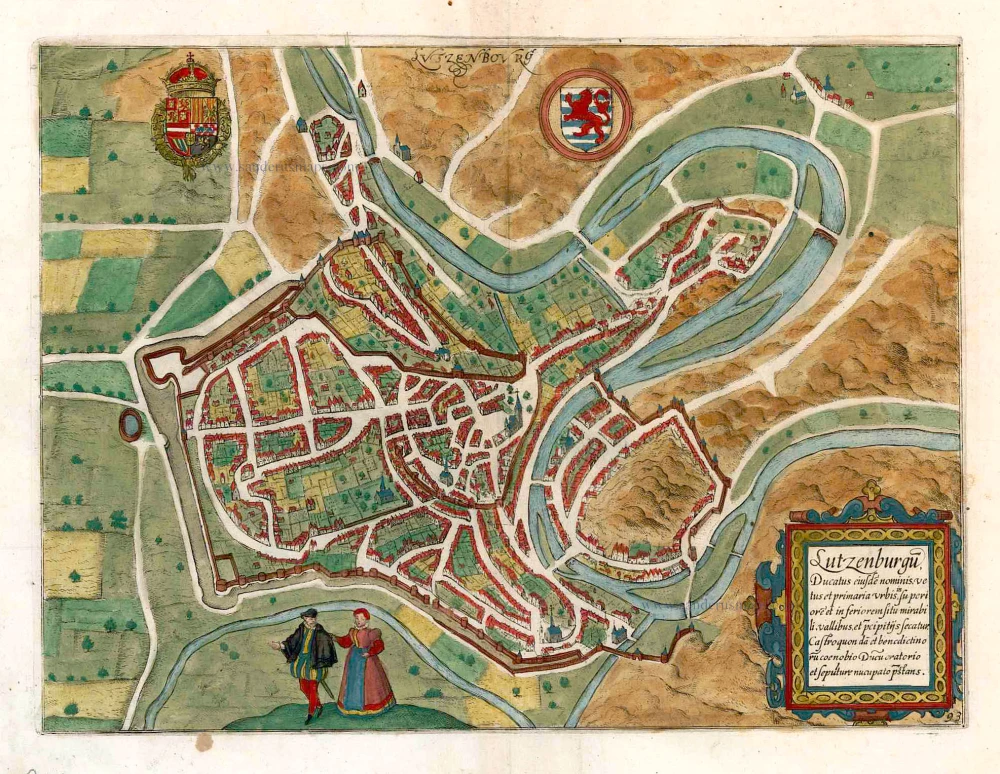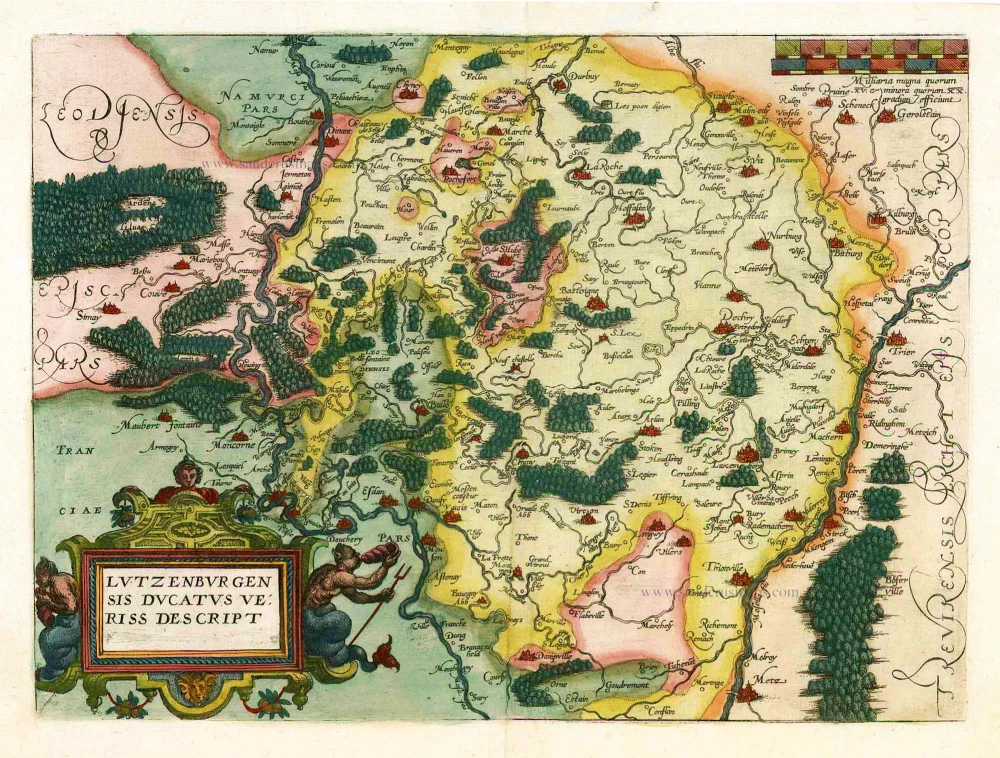Old antique map of Luxembourg by Braun and Hogenberg: two bird's-eye views + depiction of stone column at right. c. 1610
TRANSLATION OF CARTOUCHE TEXT: Luxembourg, capital with the supreme court of the Duchy of the same name, is worth seeing for its mountainous and uneven location.
COMMENTARY BY BRAUN: "In this city is a magnificent Franciscan monastery, whose foundation stone is supposed to have been laid during the time of St Francis. There is also another splendid monastery, which is generally called the minster. From this minster one gradually climbs up to the New Town. For the Old Town lies down below in a deep valley to the left of the cliff and is now considered to be the suburb. For as it was difficult to defend it was gradually found to be better to build the city higher up. ..."
The present illustration shows the city in cavalier perspective from the east. The location of the Upper Town, perched on a rocky plateau high above the steep-sided Alzette Valley, is clearly portrayed. The tower appearing at the bottom of the top illustration forms part of the palace illustrated separately below, which today lies in the Luxembourg suburb of Clausen. Seen here from the east, the palace and its magnificent formal gardens were the residence of Peter Ernst I of Mansfeld, commander of the Spanish armies in the Netherlands from 1545 to 1604 and during this same period governor of Luxembourg, the Netherlands and Brussels. The caption in the picture emphasizes the magnificence of the palace interior: "... admirable for its outstanding paintings and antiquities".
IGEL COLUMN (IGELER SÄULE)
CAPTION: A monument in Igel famed for its venerable age, about one mile from Trier in the direction of Luxembourg, 12 feet wide at the base and 72 feet high. There is almost none lovelier this side of the Alps.
COMMENTARY BY BRAUN: "On the Moselle, in Igel, one mile from Trier in the direction of Luxembourg, is an old monument or tomb that is almost intact, such as is not often seen even in Italy, the homeland of antiquities."
The right-hand illustration shows the Igel column, a 23-m-high Roman funerary monument of red sandstone dating from the middle of the 3rd century AD. The column was erected by the Secundinii family of cloth merchants and its decorative reliefs include scenes from their daily lives. The column is the oldest monument of its kind north of the Alps and is today a UNESCO World Heritage Site. (Taschen)
Braun G. & Hogenberg F. and the Civitates Orbis Terrarum.
The Civitates Orbis Terrarum, or the "Braun & Hogenberg", is a six-volume town atlas and the most excellent book of town views and plans ever published: 363 engravings, sometimes beautifully coloured. It was one of the best-selling works in the last quarter of the 16th century. Georg Braun wrote the text accompanying the plans and views on the verso. Many plates were engraved after the original drawings of a professional artist, a professional artist, Joris Hoefnagel (1542-1600). The first volume was published in Latin in 1572, and the sixth in 1617. Frans Hogenberg created the tables for volumes I through IV, and Simon van den Neuwel made those for volumes V and VI. Other contributors were cartographers Daniel Freese and Heinrich Rantzau. Works by Jacob van Deventer, Sebastian Münster, and Johannes Stumpf were also used. Translations appeared in German and French.
Following the original publication of Volume 1 of the Civitates in 1572, seven further editions of 1575, 1577, 1582, 1588, 1593, 1599 and 1612 can be identified. Vol.2, first issued in 1575, was followed by further editions in 1597 and 1612. The subsequent volumes appeared in 1581, 1588, 1593, 1599 and 1606. The German translation of the first volume appeared from 1574 on, and the French edition from 1575 on.
Several printers were involved: Theodor Graminaeus, Heinrich von Aich, Gottfried von Kempen, Johannis Sinniger, Bertram Buchholtz and Peter von Brachel, who all worked in Cologne.
Georg Braun (1541-1622)
Georg Braun was born in Cologne in 1541. After his studies in Cologne, he entered the Jesuit Order as a novice. 1561, he obtained his bachelor's degree, and in 1562, he received his Magister Artium. Although he left the Jesuit Order, he studied theology, gaining a licentiate in theology.
Frans Hogenberg (1535-1590)
Frans Hogenberg was a Flemish and German painter, engraver, and mapmaker. He was born in Mechelen as the son of Nicolaas Hogenberg.
By the end of the 1560s, Frans Hogenberg was employed upon Abraham Ortelius's Theatrum Orbis Terrarum, published in 1570; he is named an engraver of numerous maps. In 1568, he was banned from Antwerp by the Duke of Alva and travelled to London, where he stayed a few years before emigrating to Cologne. He immediately embarked on his two most important works, the Civitates, published in 1572 and the Geschichtsblätter, which appeared in several series from 1569 until about 1587.
Thanks to large-scale projects like the Geschichtsblätter and the Civitates, Hogenberg's social circumstances improved with each passing year. He died as a wealthy man in Cologne in 1590.
Lucenburgum Urbs eiusdem nominis Ducatus primaria et Tribunam supremum, montoso inaequali situ spectabilis.
Item Number: 10355 Authenticity Guarantee
Category: Antique maps > Europe > Luxembourg
Old antique map of Luxembourg by Braun and Hogenberg: two bird's-eye views + depiction of stone column at right.
TRANSLATION OF CARTOUCHE TEXT: Luxembourg, capital with the supreme court of the Duchy of the same name, is worth seeing for its mountainous and uneven location.
COMMENTARY BY BRAUN: "In this city is a magnificent Franciscan monastery, whose foundation stone is supposed to have been laid during the time of St Francis. There is also another splendid monastery, which is generally called the minster. From this minster one gradually climbs up to the New Town. For the Old Town lies down below in a deep valley to the left of the cliff and is now considered to be the suburb. For as it was difficult to defend it was gradually found to be better to build the city higher up. ..."
The present illustration shows the city in cavalier perspective from the east. The location of the Upper Town, perched on a rocky plateau high above the steep-sided Alzette Valley, is clearly portrayed. The tower appearing at the bottom of the top illustration forms part of the palace illustrated separately below, which today lies in the Luxembourg suburb of Clausen. Seen here from the east, the palace and its magnificent formal gardens were the residence of Peter Ernst I of Mansfeld, commander of the Spanish armies in the Netherlands from 1545 to 1604 and during this same period governor of Luxembourg, the Netherlands and Brussels. The caption in the picture emphasizes the magnificence of the palace interior: "... admirable for its outstanding paintings and antiquities".
IGEL COLUMN (IGELER SÄULE)
CAPTION: A monument in Igel famed for its venerable age, about one mile from Trier in the direction of Luxembourg, 12 feet wide at the base and 72 feet high. There is almost none lovelier this side of the Alps.
COMMENTARY BY BRAUN: "On the Moselle, in Igel, one mile from Trier in the direction of Luxembourg, is an old monument or tomb that is almost intact, such as is not often seen even in Italy, the homeland of antiquities."
The right-hand illustration shows the Igel column, a 23-m-high Roman funerary monument of red sandstone dating from the middle of the 3rd century AD. The column was erected by the Secundinii family of cloth merchants and its decorative reliefs include scenes from their daily lives. The column is the oldest monument of its kind north of the Alps and is today a UNESCO World Heritage Site. (Taschen)
Date of the first edition: 1596
Date of this map: c. 1610
Copper engraving
Size: 36.5 x 46.5cm (14.2 x 18.1 inches)
Verso text: French
Condition: Uncoloured, excellent.
Condition Rating: A
References: Van der Krogt 4, 2515; Taschen, Braun and Hogenberg, p.376.
From: Théâtre des Principales Villes de tout l'Univers. Tome 5. c. 1610.
TRANSLATION OF CARTOUCHE TEXT: Luxembourg, capital with the supreme court of the Duchy of the same name, is worth seeing for its mountainous and uneven location.
COMMENTARY BY BRAUN: "In this city is a magnificent Franciscan monastery, whose foundation stone is supposed to have been laid during the time of St Francis. There is also another splendid monastery, which is generally called the minster. From this minster one gradually climbs up to the New Town. For the Old Town lies down below in a deep valley to the left of the cliff and is now considered to be the suburb. For as it was difficult to defend it was gradually found to be better to build the city higher up. ..."
The present illustration shows the city in cavalier perspective from the east. The location of the Upper Town, perched on a rocky plateau high above the steep-sided Alzette Valley, is clearly portrayed. The tower appearing at the bottom of the top illustration forms part of the palace illustrated separately below, which today lies in the Luxembourg suburb of Clausen. Seen here from the east, the palace and its magnificent formal gardens were the residence of Peter Ernst I of Mansfeld, commander of the Spanish armies in the Netherlands from 1545 to 1604 and during this same period governor of Luxembourg, the Netherlands and Brussels. The caption in the picture emphasizes the magnificence of the palace interior: "... admirable for its outstanding paintings and antiquities".
IGEL COLUMN (IGELER SÄULE)
CAPTION: A monument in Igel famed for its venerable age, about one mile from Trier in the direction of Luxembourg, 12 feet wide at the base and 72 feet high. There is almost none lovelier this side of the Alps.
COMMENTARY BY BRAUN: "On the Moselle, in Igel, one mile from Trier in the direction of Luxembourg, is an old monument or tomb that is almost intact, such as is not often seen even in Italy, the homeland of antiquities."
The right-hand illustration shows the Igel column, a 23-m-high Roman funerary monument of red sandstone dating from the middle of the 3rd century AD. The column was erected by the Secundinii family of cloth merchants and its decorative reliefs include scenes from their daily lives. The column is the oldest monument of its kind north of the Alps and is today a UNESCO World Heritage Site. (Taschen)
Braun G. & Hogenberg F. and the Civitates Orbis Terrarum.
The Civitates Orbis Terrarum, or the "Braun & Hogenberg", is a six-volume town atlas and the most excellent book of town views and plans ever published: 363 engravings, sometimes beautifully coloured. It was one of the best-selling works in the last quarter of the 16th century. Georg Braun wrote the text accompanying the plans and views on the verso. Many plates were engraved after the original drawings of a professional artist, a professional artist, Joris Hoefnagel (1542-1600). The first volume was published in Latin in 1572, and the sixth in 1617. Frans Hogenberg created the tables for volumes I through IV, and Simon van den Neuwel made those for volumes V and VI. Other contributors were cartographers Daniel Freese and Heinrich Rantzau. Works by Jacob van Deventer, Sebastian Münster, and Johannes Stumpf were also used. Translations appeared in German and French.
Following the original publication of Volume 1 of the Civitates in 1572, seven further editions of 1575, 1577, 1582, 1588, 1593, 1599 and 1612 can be identified. Vol.2, first issued in 1575, was followed by further editions in 1597 and 1612. The subsequent volumes appeared in 1581, 1588, 1593, 1599 and 1606. The German translation of the first volume appeared from 1574 on, and the French edition from 1575 on.
Several printers were involved: Theodor Graminaeus, Heinrich von Aich, Gottfried von Kempen, Johannis Sinniger, Bertram Buchholtz and Peter von Brachel, who all worked in Cologne.
Georg Braun (1541-1622)
Georg Braun was born in Cologne in 1541. After his studies in Cologne, he entered the Jesuit Order as a novice. 1561, he obtained his bachelor's degree, and in 1562, he received his Magister Artium. Although he left the Jesuit Order, he studied theology, gaining a licentiate in theology.
Frans Hogenberg (1535-1590)
Frans Hogenberg was a Flemish and German painter, engraver, and mapmaker. He was born in Mechelen as the son of Nicolaas Hogenberg.
By the end of the 1560s, Frans Hogenberg was employed upon Abraham Ortelius's Theatrum Orbis Terrarum, published in 1570; he is named an engraver of numerous maps. In 1568, he was banned from Antwerp by the Duke of Alva and travelled to London, where he stayed a few years before emigrating to Cologne. He immediately embarked on his two most important works, the Civitates, published in 1572 and the Geschichtsblätter, which appeared in several series from 1569 until about 1587.
Thanks to large-scale projects like the Geschichtsblätter and the Civitates, Hogenberg's social circumstances improved with each passing year. He died as a wealthy man in Cologne in 1590.

